Shopify vs BigCommerce: Which is better for your online store?
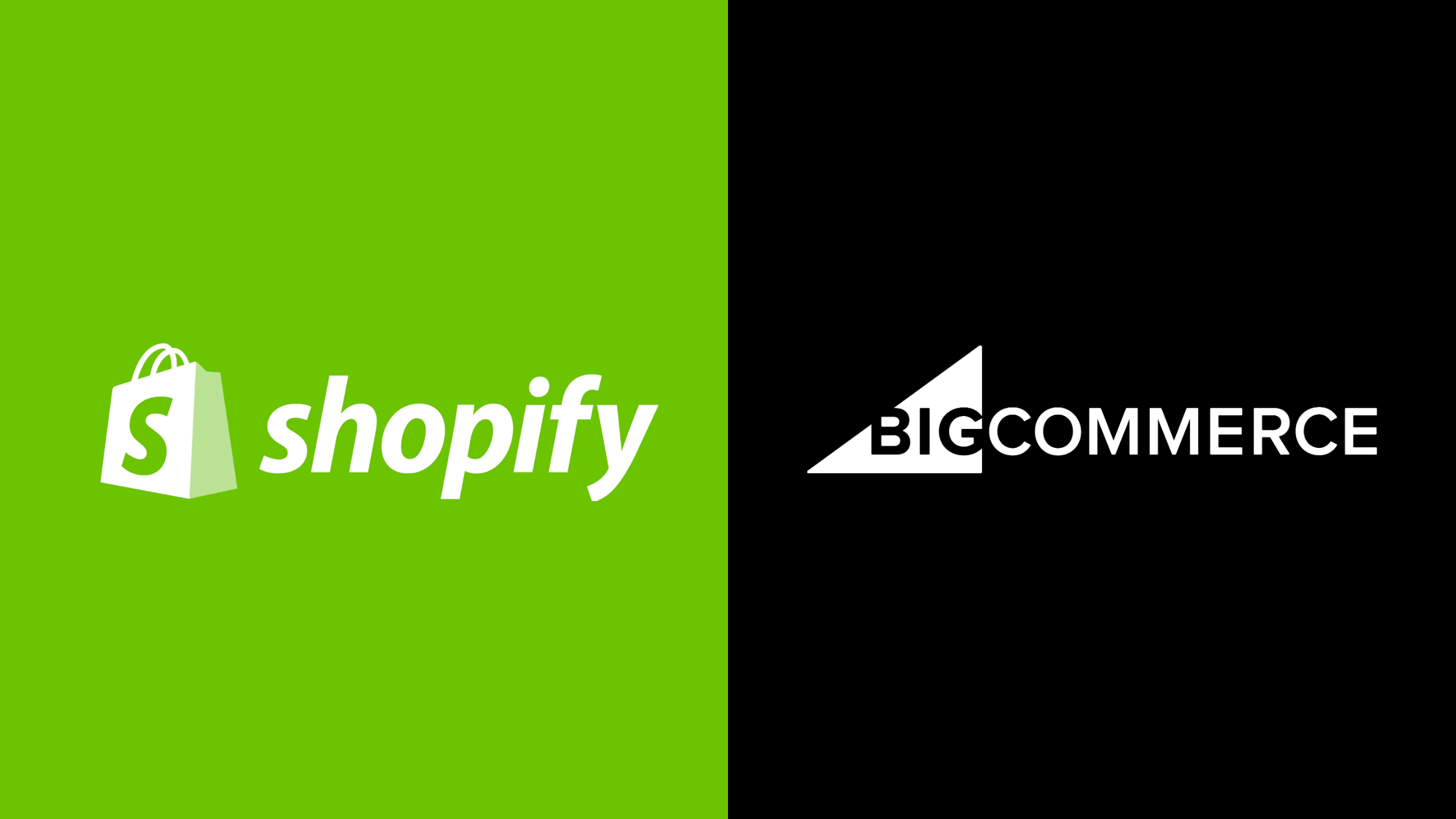
If you're reading this article, it's because you're likely evaluating Shopify and BigCommerce as e-commerce platforms. Both tools can help you create your own online store and start selling your products.
But which one is the best option for you?
If you want to find out, stay tuned as we analyze and compare the features, advantages, and disadvantages of both platforms.
Shopify
The platform was founded in 2006 by Tobias Lütke, Daniel Weinand, and Scott Lake. The founders, dissatisfied with the tools available for creating online stores, decided to develop their own software and create a platform that would adapt to their needs.
Years later (specifically in 2009), they launched their app store, where you can buy different applications to improve your online store.
Shopify's growth has been impressive, currently they have more than 700,000 stores worldwide.
BigCommerce
BigCommerce was founded in 2009 in Sydney, Australia. Currently, they have over 600 employees and their headquarters are based in Austin, Texas.
More than 60,000 businesses in 120 countries use this platform within their online store. Some of the companies that use this platform are Gillette, Skullcandy, and Ben & Jerry's. In 2020, it generated more than 180 million dollars.
Plans and Prices
Shopify and BigCommerce handle very similar plans and prices.
Shopify Prices
Basic Shopify Plan $29.00 USD
Shopify Plan $79.00 USD
Shopify Advanced Plan $299.00 USD
BigCommerce Prices
Standard Plan $29.95 USD
Plus Plan $79.95 USD
Pro Plan $299.95 USD
At first glance, it seems that the cost of both platforms ends up being the same. But that is not entirely true, because to get key eCommerce functionality on Shopify, you will have to pay the extra cost of several plugins.
While BigCommerce has key functionality without having to pay any extra cost. Below we will evaluate which functionalities have extra cost on Shopify but are completely free on BigCommerce.
Themes or Templates
The themes or templates in an eCommerce platform are key to designing your online store.
The more design templates you have as an option, the better.
Since you will have a great variety of templates to select that fit your company's brand identity. Furthermore, it is less likely that your online store will look like others' brands if there are more template options.
Shopify has 102 themes that you can select, of which 9 are free and 93 have a cost.
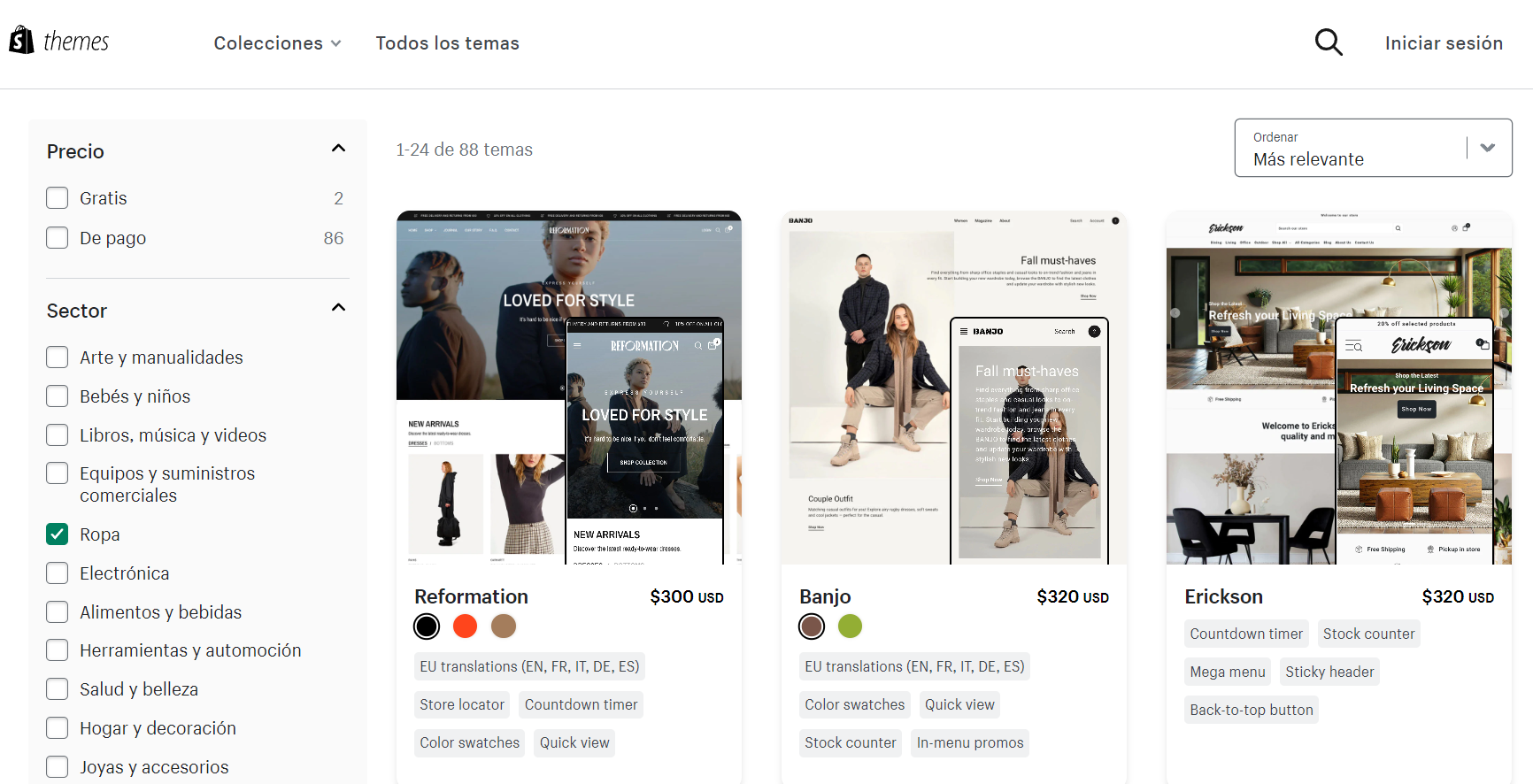
BigCommerce has over 300 themes, of which 12 are free.

It should be noted that both platforms have templates for art, books, electronics, health, jewelry, home, sports, etc. stores.
Plugins
Plugins are small complementary programs that expand the functions of your eCommerce.
There are plugins to add pop ups, generate a newsletter, design new banners on the site, receive payments, connect with Google Analytics, create discount coupons, among other multitude of functionalities.
Plugins are key to covering all those functionalities that your eCommerce platform does not include. This saves companies from having to hire a programmer to develop those specific functionalities that the business requires.
Shopify offers over 4,000 plugins that you can integrate into your online store, and over 1,500 of these are free. There is a large community of developers who are dedicated to building and maintaining new plugins for the platform.
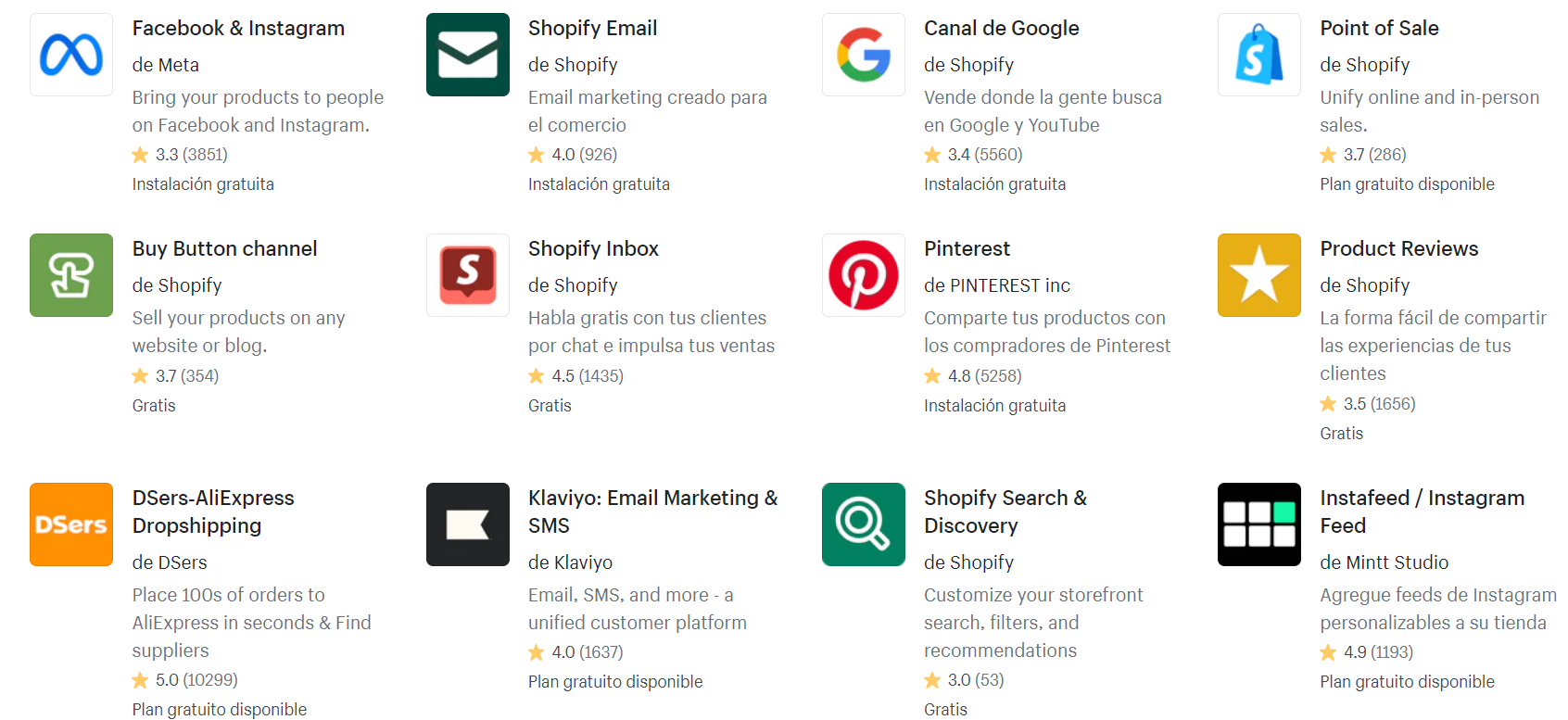
Therefore, you can be quite certain that if you need a functionality that Shopify does not include by default, you can probably find several plugins to help you solve the problem.
BigCommerce has a little over 1,000 plugins, so it may take you a little longer to find exactly the plugins you need to meet your day-to-day needs. Or, you will have to hire a programmer to develop the missing functionalities.
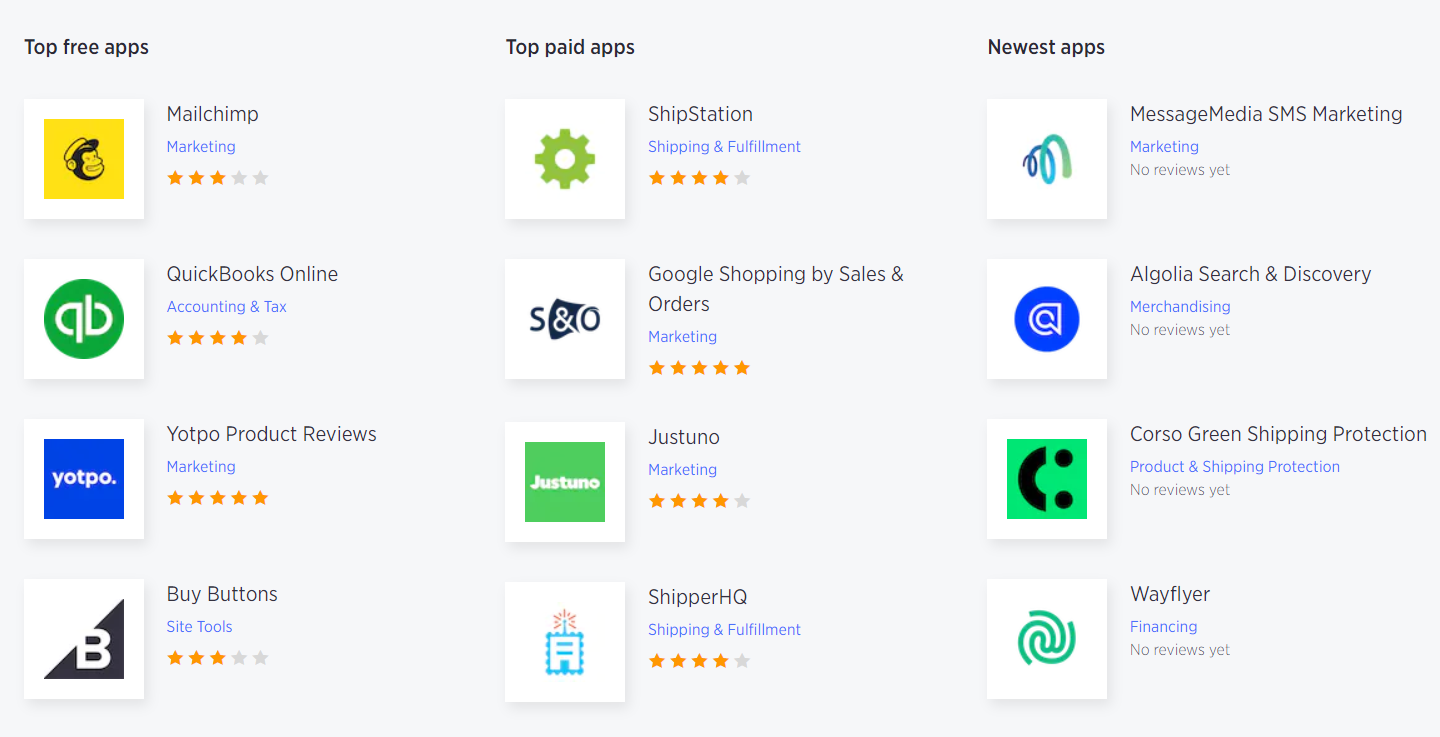
As you can see, Shopify has thousands of plugins that will help you resolve the needs of your business.
Product options and variety
The same product can come in different styles, colors, sizes, or features. It's important to evaluate whether your online store is able to support all of your products and their different variations.
For example, the same sneakers can come in 5 different colors and 17 different sizes, which would give a total of 85 possible combinations.
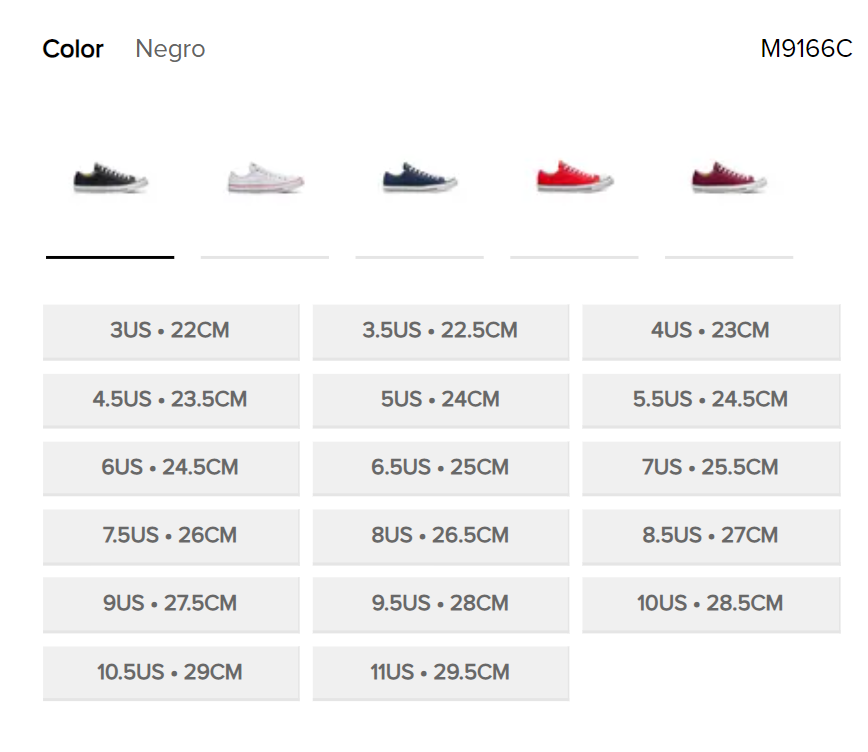
Shopify natively supports up to three sub-categorizations of the same product with a limit of 100 possible combinations or variants. If you need to have more variants for your products, you will have to install third-party plugins and pay an extra cost.
BigCommerce, on the other hand, does not have to worry about the limitation of combinations for your products. It accepts up to 600 possible combinations without having to pay for a third-party application.
The platform also allows you to natively display the full variety of your products through different graphical styles. You can use drop-down menus, radio buttons, checkboxes, swatch options, text and number fields, date fields, and product selection lists.
This way you can show off your entire product variety just as you imagine it.
Payment Gateways
A payment gateway is an external provider that processes payments so that online stores can offer multiple payment methods and their users can make purchases easily and securely.
Shopify has a default payment gateway that will help you receive payments by credit card, debit card, and PayPal. It charges a transaction fee of between 2.4% and 2.9%, depending on your plan.
If you want to use another external payment provider other than Shopify Payments, you will be charged an extra fee between 0.5% and 2%.
With Shopify, you can integrate with payment platforms like OpenPay, Conekta, Mercado Pago, Kueski Pay, PayU, or Stripe.
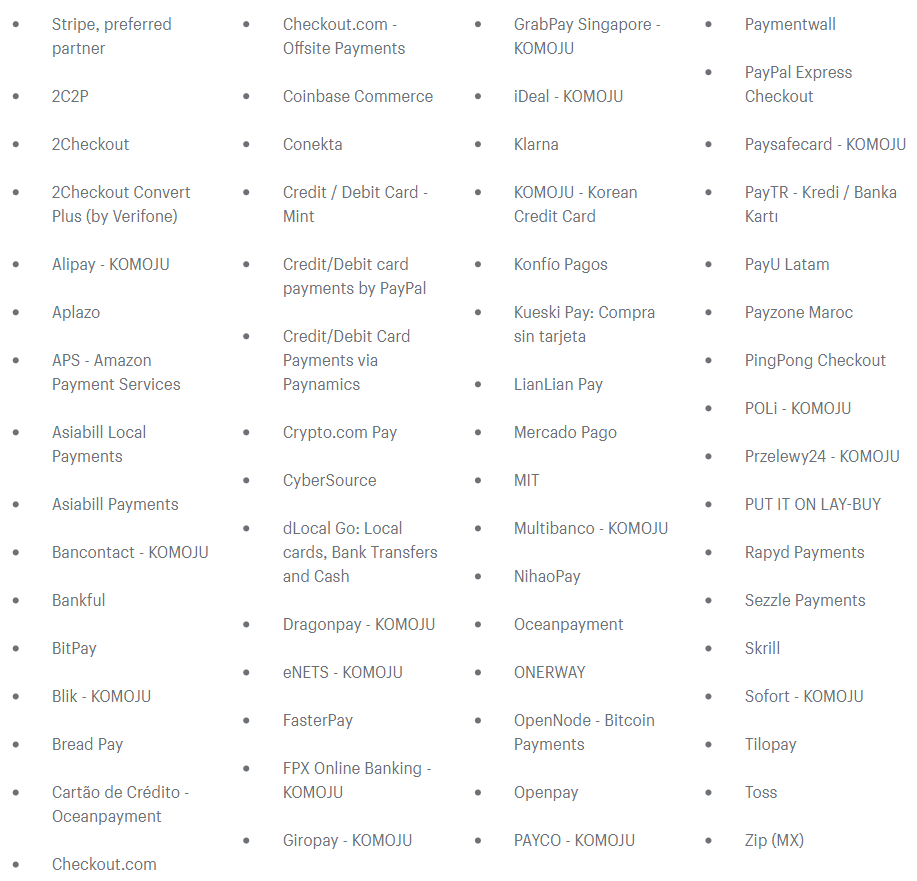
Compatible Payment Gateways with Shopify Mexico. View the complete list by country here.
BigCommerce charges a transaction fee between 2.05% and 2.59% through its own payment processor. If you want to install another payment platform, unlike Shopify, it does not charge any extra fee for choosing other payment providers.
Some of the available payment processors with BigCommerce are: Adyen, Affirm OpenPay, Stripe, and dLocal.

Compatible Payment Gateways with BigCommerce. Check out the full list here.
Discounts
Discounts are a key strategy for any business. They help you boost sales and acquire more customers.
So you need to make sure that your online store has the necessary features to create and apply discounts to your customer's purchases.
In Shopify and BigCommerce, you can easily create and apply discounts on your products and generate discount coupons for your customer's purchases. They also have the ability to offer 2x1 on products.
However, Shopify does not have the ability to apply cart-level discounts.
Cart-level discounts are discounts that are automatically applied based on a set of rules. For example, let's say you want to apply a 20% discount on all shopping carts that exceed $100 USD. Shopify does not have the ability to automatically apply this discount when the customer goes to complete their payment.
To apply the discount, your customer would have to forcibly put in a discount code. The more steps we put the user through to complete the desired task, the more complex the experience becomes and it becomes more likely that the user will abandon their shopping process. Hence the importance of cart-level discounts.
To apply automatic discounts in Shopify, you will have to pay for a plugin.
In BigCommerce, you can create over 70 coupons and automatic discounts quickly andeasily without any extra cost. Companies with a BigCommerce Plus plan have the ability to create discounts for a specific group of customers.
This means you can give special discounts to your most loyal customers that are not available to the general public.
Shopify offers customer group discount functionality in its Plus version. Which significantly increases in price.
SEO
Optimizing your SEO will allow you to appear in the first results on Google. This will help you have more traffic to your site and therefore more sales. So it's something important you should keep in mind when selecting an e-commerce platform.
Shopify allows companies to modify page titles and support HTTPS. You can enable a free SSL certificate through Let's Encrypt.
Having complete control over how a URL is composed is key to improving your site's SEO. One of the disadvantages of Shopify is that you simply can't edit URLs. For example, you can't remove words like "/collections/", "/products/", or "/pages/" from a URL.
In BigCommerce, the URLs are already predetermined (products, categories and pages) following the best SEO practices. But unlike Shopify, they are fully customizable by the seller.
Another key point for optimizing your site's SEO is for your platform to work correctly on mobile and computer.
Shopify and BigCommerce have responsive themes that adapt to mobile and desktop. They include a content delivery network (CDN) to deliver photos and other files based on the visitor's country.
Image optimization is key to positioning your site on search engines. If your images are heavy, your site will be slow. Load speed is a topic evaluated by Google to determine how you rank in search results.
BigCommerce has Akamai Manager. This tool is native to the platform and automatically reduces the size of your images to obtain the best dimension, quality, and format for each device.
Shopify doesn't have any native tool to optimize your site's images. But you can integrate a plugin into your online store to reduce the size of your images.
Mobile load speed is important for the user and also for SEO. The faster your site is on mobile devices, the better your overall ranking will be.
BigCommerce offers a variety of Google AMP (Accelerated Mobile Pages), which allows companies to deliver highly fast product and category pages.
Shopify-based platforms have to integrate plugins into their site to deliver the same experience.
Another point that Google evaluates to position your site is breadcrumbs. Breadcrumbs are visual guides that tell users where they are within a web page.

The traditional structure of BigCommerce category, subcategory, improves your SEO by creating URLs and breadcrumbs that help search engines understand the structure of your page.
BigCommerce allows you to filter products by brand and price. Companies with a Pro or Enterprise plan also have access to faceted search, which allows them to further refine the product structure through custom values and filters, providing your users with the ideal shopping experience.
Shopify stores use the collections structure instead of traditional categories. This provides a simple way to organize products by collections that self-populate based on product features such as type, vendor, tags, or price.
Collections are useful for creating categories that show products within a price range or products on sale. However, this structure lacks the advantages of a "category/subcategory" structure, such as the best organic positioning and ease of navigation for the user.
Shopify-based merchants can generate search engine friendly breadcrumbs and URLs by combining collections with basic filters or using third-party integrations to try and simplify the structure. However, this is a manual task that will consume a lot of time.
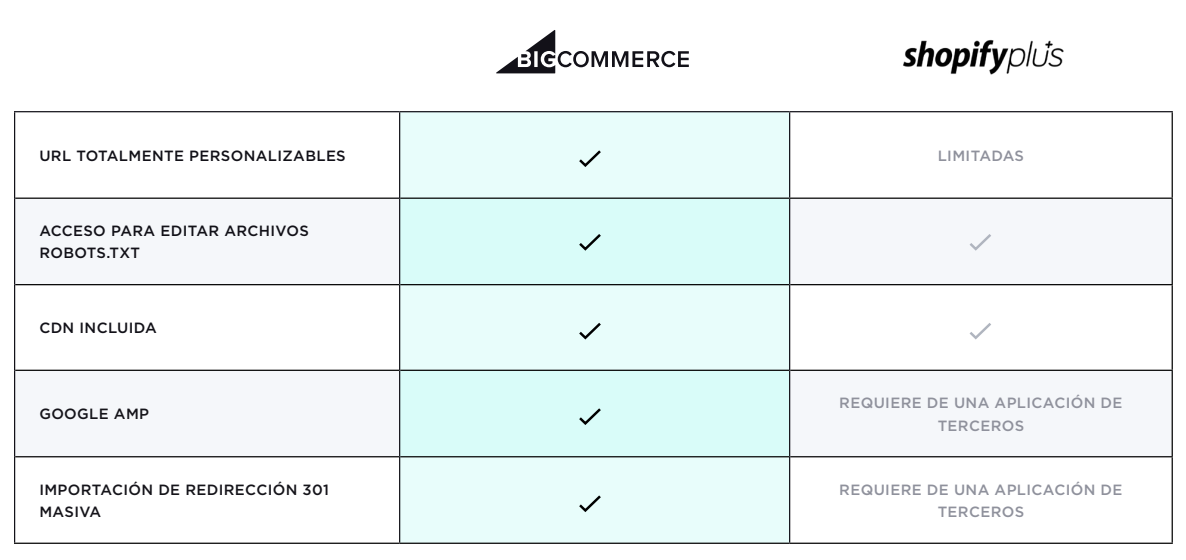
Order Management
Both tools have basic functions to manage your customer orders.
Your customers can add products to their shopping cart, make their payment with a credit card, and you receive a purchase order with the products and delivery address.
However, there are more advanced functionalities that you should consider for order management.
For example, what happens if a customer wants to add a new product to their purchase, or what if the customer makes a mistake in their address?
Ideally, the customer should be able to communicate with you to edit their order. This is where both platforms differ.
Shopify does not have any native tool to edit your customer's orders. In this case, your customer would have to cancel their purchase and make it again. However, this makes the user experience more complicated.
To get this functionality on Shopify, you would have to pay for a new plugin that helps you edit customer purchase orders.
With BigCommerce, your team can simply edit the customer's purchase order without having to install a new plugin, as this functionality is native to the platform.
Integration with Other Platforms
One of the most important parts of your e-commerce is the technology stack.
The technology stack is the group of technologies under which a digital application is built. In e-commerce, you have to think about the CMS, search engine, personalization engine, analytics, among other tools.
There is no e-commerce platform that meets all the needs of the current digital consumer. That's why it's important that you can integrate the best-of-breed technologies into your online store.
Shopify has a monolithic software architecture that does not allow for easy integration with new technologies.
Although it has multiple plugins that will help you connect with the most commonly used technological tools in the market. You can use Wordpress as a CMS, Google Analytics as an analytics tool, or Doofinder as a search engine.
While BigCommerce allows you to build a composable architecture. It offers multiple facilities so you can connect your e-commerce with platforms from other manufacturers.
Thus achieving the best-of-breed technologies. This means you can integrate Adobe Experience Manager as a CMS, Dynamic Yield as a personalization engine, or Algolia as a search engine.
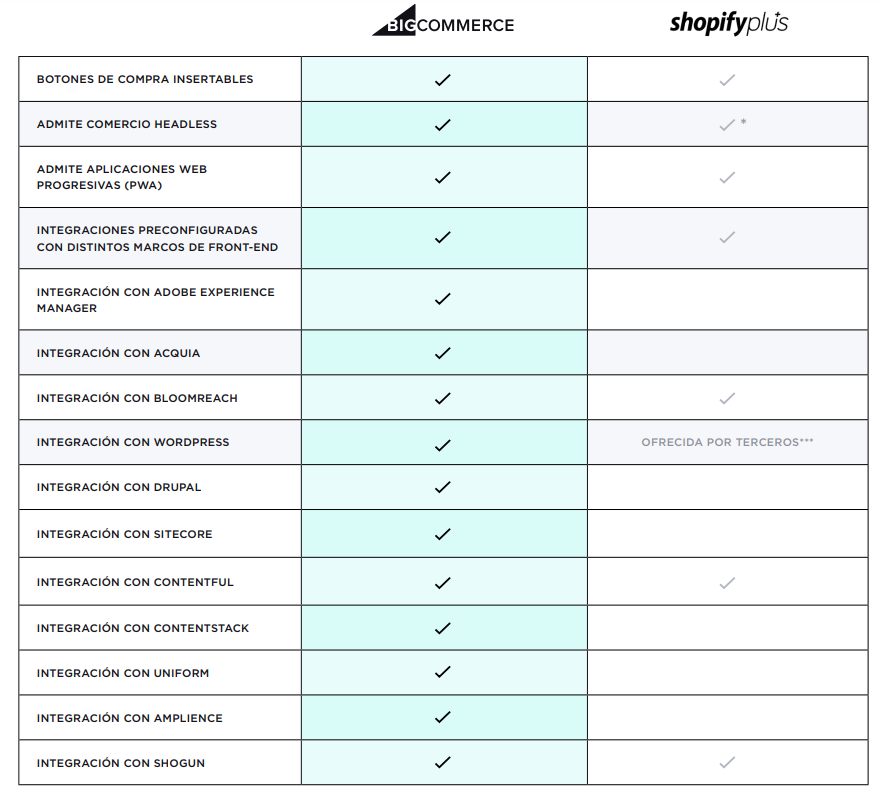
Support
The support provided by a platform is important for putting out fires within your e-commerce. If you have a problem that affects your business productivity, you can lose a lot of money.
Think about what you're going to do the day your site crashes, that for some reason your site is rejecting all payments, that your customers can't log in, that during the sales season the discounts are not being applied.
That day you will need the platform support to respond immediately.
There's nothing worse than your online store not working and there's no one available to help you.
In this case, Shopify is known for not having the best support. Their team usually responds in a matter of days. And every day that passes without you being able to solve your problem, you're losing sales and customers.
BigCommerce is famous for the great quality service it offers to its clients. They have a first-class support.
They offer support teams to help you migrate and launch your business with ease. Their support works 24/7 through chat, email, and phone to resolve technical problems. They have an average response time of just two minutes. They resolve 90% of problems on the first call.
B2B/B2C Commerce
Today, B2B e-commerce is growing exponentially worldwide. It is estimated that by 2025, digital commerce between companies will reach a value of up to 4,600 billion dollars.
If your company wants to sell to the end consumer at this moment and integrate into the B2B digital market in the long term, you must think about the capabilities offered by each of these platforms.
In B2B sales, a common practice is to offer bulk discounts for those customers who purchase large volumes of products.
BigCommerce allows bulk discounts for both B2C and B2B customers. However, Shopify only has this functionality available for B2B businesses.
In B2B sales, companies often purchase similar products in similar quantities. Repeatedly making the same order each time a purchase is made takes time from the buyer. Your user should be able to make pre-saved shopping lists with frequently purchased products to streamline the sale.
This functionality is included in BigCommerce for B2C and B2B buyers. Shopify only allows this functionality in its B2B version, but not in its B2C version.
In a B2B company, each buyer and negotiator has different attributes and decision-making power. So, each of your customer's buyers should have different purchase permissions, such as the amount they can buy, the discounts they can get, or the credit they can request.
This is completely possible with BigCommerce as it is a native functionality. To acquire this functionality in Shopify, you have to purchase a third-party plugin.
Another key capability that a B2B e-commerce should have is for a user to be able to repeat the same purchase with the same products, quantities, and prices.
This capability is enabled natively in BigCommerce. In Shopify, you would have to integrate and pay for a third-party application.
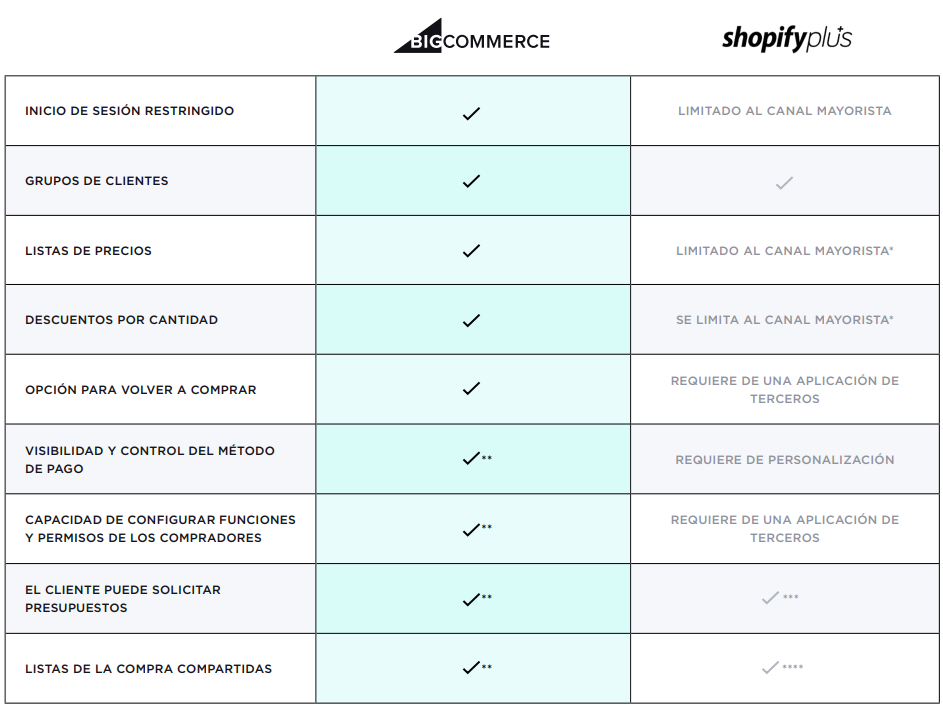
**The Shopify Plus wholesale channel has price lists that support up to 3 quantity discounts on a product or variety. However, sellers who want to offer quantity discounts in their main store have to use a third-party app.
**These features are available in BigCommerce B2B Edition. The customer quote feature is also available for BigCommerce sellers who use B2B Ninja.
***Shopify Plus does not natively support the function of customers sending or requesting quotes, but wholesale channel sellers can send a draft order as a quote/purchase order.
****Shopify Plus does not natively support shared shopping lists, but by creating draft orders you can "reserve items" to hold them and create draft orders to share via a link.
Multi-Storefront
Multi-Storefront is a capability that allows companies to manage different online stores for different brands, with different products, for delivery to different countries, with different languages and from different countries, all in one panel.
This is an interesting capability for those companies that have multiple brands with different products and based in different countries.
In BigCommerce, you can manage more than one store from a single panel, saving you the headache of having to manage multiple stores separately. You would have your stores, users, products, inventories and orders unified in one platform.
Shopify does not have the Multi-Storefront functionality. To manage your stores, you would have to manage each one separately, meaning that all of your business information would be fragmented across multiple platforms.
Community
Another way to solve the day-to-day problems of your e-commerce is to rely on the community that uses the same platform. Since the problem you have with your online store, someone else already had it and already solved it.
As mentioned at the beginning, Shopify has over 700,000 active online stores. So there is a large community where you can support yourself.
BigCommerce also has a very active community of merchants where you can resolve all your doubts regarding the platform. You can ask questions on their forum to talk with other merchants with the same problems as you.
Unlike the green platform, BigCommerce users can request new functionality and vote for those of their preference.
When a merchant's request begins to be developed, the community is notified that the functionality is in the process of creation.
Several times the CEO and CPO (Chief Product Officer) and the product team respond to requests and comments directly from the BigCommerce community.
Constantly, the BigCommerce team announces the new functionalities that are planned to be developed in the year for the platform. This in order to keep the community informed and receive its feedback.
We could say that the Shopify community is larger and it is easier to get help from other users. But with BigCommerce, you will have greater contact with the team that develops the platform.
Final comparison between Shopify and BigCommerce
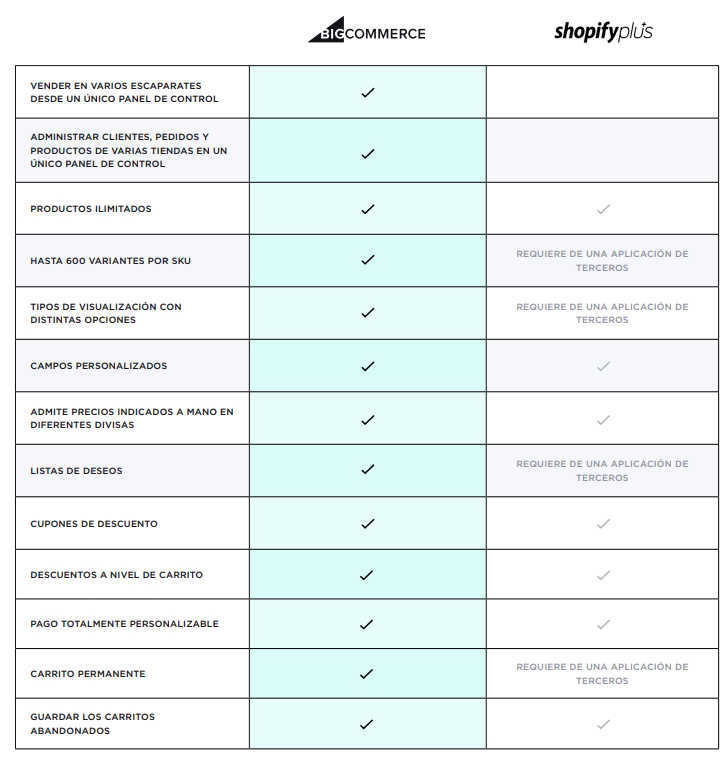
What is the best option, Shopify or BigCommerce?
At this point, you probably want a concrete answer. And you want to hear that Shopify is better or BigCommerce is better.
The reality is that both platforms have advantages and disadvantages. And the correct question is not "which is the best platform for creating an online store?" The correct question is "which is the best option for my business and needs?"
Shopify is your best option if:
You are a small business with limited budget
You are opening your first online store
You want a simple and easy to use solution
You do not want to deal with programming issues
You also do not want to spend on paying a programmer
Shopify will allow you to open your online store without having any programming knowledge. Since it offers a lot of plugins that will help you get most of the basic e-commerce functionalities. This without having to resort to high costs of developers. In this case, probably BigCommerce is not suitable for you.
Since every time you want to add a new functionality to your platform, you will be limited by the limited offer of plugins, and you will have to hire programmers to develop new functionalities.
BigCommerce is your best option if:
You are a medium or large company with a considerable budget
You have a team of programmers ready to help you
You do not want to assume the cost of paying for extra plugins
You want to scale in the long term
You are looking to deliver complex and personalized experiences to your customers
BigCommerce is a platform that enables scalability in the long term. It enables your development team to create new functionalities and integrate new technologies into your technology stack. Achieving greater control over the experience you deliver to your customers.
In this case, probably Shopify is not a good option for you. At some point, the platform will limit the growth of your e-commerce. And you will have to be paying for the extra Shopify plugins costs.
In addition, plugins being a separate program from your main platform make your site slower affecting loading times.
On the other hand, Shopify being a monolithic platform, will make it more difficult to integrate better technologies into your e-commerce.


